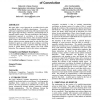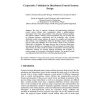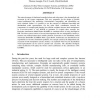2178 search results - page 31 / 436 » Problems of learning in multi-agent systems |
SAC
2004
ACM
14 years 3 months ago
2004
ACM
We study two properties of coalition formation algorithms, very important for their application in real-life scenarios: robustness and tolerance to some agent misbehaviors. The st...
ATAL
2008
Springer
13 years 12 months ago
2008
Springer
In most of the existing approaches to the design of multiagent systems, there is no clear way in which to relate organisational and normative structures to the model of the enviro...
GECCO
2005
Springer
14 years 3 months ago
2005
Springer
This paper offers a novel approach to coevolution based on the sociological theory of symbolic interactionism. It provides a multi-agent computational model along with experimenta...
CDVE
2007
Springer
14 years 4 months ago
2007
Springer
The team of engineers designing and implementing distributed control system software must communicate within a multidisciplinary environment. One of the main problems is the intera...
DAGSTUHL
1994
13 years 11 months ago
1994
The main advantage of distributed controlled robots and subsystems is the decentralized task execution by the system components. This way, properties for the design of flexible co...



